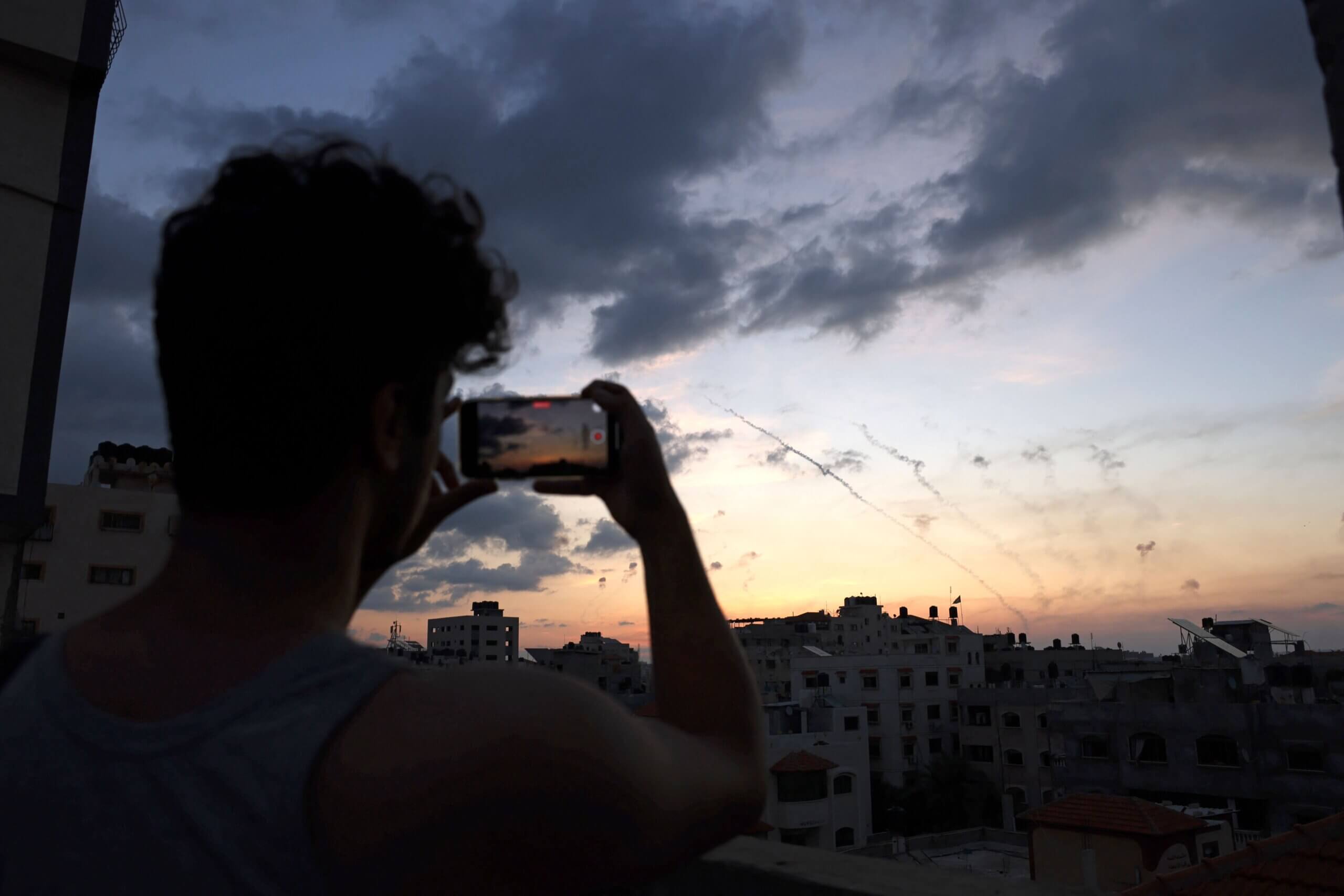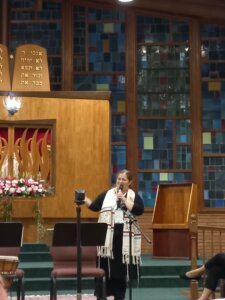Looking Forward‘Is it a war — or is it an operation?’ Thousands of miles from home, Israeli teenagers learn the devastating news
At a “shul-in” in New Jersey, they conked out in sleeping bags. Then they woke up and looked at their phones.

A man records a video with his mobile phone of rockets being fired from Gaza City towards Israel. Photo by Getty Images
Thankfully, Rabbi Rinat Safania had taken away the teenagers’ cell phones the night before.
She’d wanted the five kids she’d brought from her Reform congregation in the central Israel town of Shoham to focus on bonding with their American counterparts during a special “shul in” at my New Jersey synagogue. They’d played Jewish bingo, scarfed pretzels and given each other facials before conking out around 1:30 a.m. Saturday on the floor of the youth lounge.
Now, Rabbi Safania had to figure out how to share the news that their country was at war, battling back the most devastating attacks it had seen in half a century.
“I will tell them the facts,” she whispered, as much to herself as to me, as we prepared to wake them up Saturday morning. “I will tell them I don’t know a lot of things.”

She would give the teens their phones back to call their parents, but implore them not to look at Instagram lest they see the horrific images of dead Israelis in the streets of Sderot. She would lead them in a prayer for peace, Oseh Shalom, “because that’s what we wish for.”
And she would tweak the day’s itinerary — keeping the afternoon visit to a rabbi in Asbury Park, thinking the ocean might be a nice distraction, but canceling evening services for Simchat Torah.
“I don’t think we can dance,” she said simply.
I wouldn’t think so. Not with more than 250 Israelis killed, hundreds more in hospitals, unknown numbers possibly abducted by Hamas militants from the Gaza Strip. Not with live fighting still raging in at least five places inside Israel after Gaza fighters penetrated the country in an unprecedented assault by land, sea and air. Not with Prime Minister Benjamin Netanyahu initiating a massive retaliation against Gaza.
How can any of us dance with the Torah this year? And yet: How can we not?
This is a moment to do Jewish, whatever that means to you. This is time to express the visceral, essential connection we as Jews have with Israel, the place and the people, regardless of the flaws in its foreign policy or democratic systems. This is a day to feel vulnerable and scared — and to stand together as a community, and understand the need to fight back.
There are many important questions to ask in the coming days. How could Israeli and U.S. intelligence have failed to detect plans for this massive, coordinated invasion? What will become of the nascent peace plans between Israel and Saudi Arabia? How might Netanyahu and his right-wing allies exploit the war footing to suppress the protest movement?
I’d rushed over to the “shul-in” my synagogue was hosting for the visiting Israeli teenagers on Saturday morning to see what questions they had. “Is it a war, or is it an operation?” was the first thing one of the Israelis asked Rabbi Safania as we gathered them for a morning maagal, or circle, and she shared the news.
He was barely past his bar mitzvah, but he knew well the nuances of the lingo. “Operation,” is what Israel calls its semi-regular military incursions in Gaza, like the 11-day blitz in 2021, known as “Operation Guardian of the Walls,” that killed 256 Palestinians and 13 Israelis. The summer-long battle I covered from the ground in 2014 was “Operation Protective Edge;” in 2012 it was “Operation Pillar of Defense.” And so on.
“It’s not an operation, because they attacked us,” Rabbi Safania explained. “The situation now, it’s called a war.”
The boy held his cheeks in his hands.
After a few minutes, I followed the American kids up to the office of Rabbi Marc Katz, for our own debriefing. One of them asked: “Why did they say it happens often?” A tricky one. “This is an extreme version of something that happens often,” Rabbi Katz said.
How old are people who serve in the reserves, one of the other New Jersey teenagers wanted to know. Who is attacking Israel? Don’t they want peace?
What time did this start? Are the Israelis going to stay another night? Isn’t it dangerous for them to go back to Israel?
“If something were happening here, would you want to be with your family?” Rabbi Katz asked back. “At times when things are spinning out of control, you just want to be somewhere where you can be in control.”
By Saturday afternoon, many airlines had canceled flights into Israel, so it was unclear if they’d be able to go back to Shoham on Sunday as planned, after a week of visiting various U.S. congregations and Jewish sites. As Rabbi Safania put it, “Ananchnu mi dakah l’dakah” — Hebrew for, essentially, we’re taking it minute by minute.
Rabbi Safania’s assistant on the trip, who is 23, sat with her legs curled up in a part of the youth lounge that was festooned with posters from Israel — a close up of dried fruit from the shuk; the Ahavah statue at the Israel Museum in Jerusalem; a Tel Aviv beach; Theodore Herzl, father of Zionism; the Star of David flag.
The young woman could not take her eyes off her phone. Her dad had already been called up for miluim, reserve duty, hours after the war broke out Saturday morning. Now her own army unit was being summoned, to protect armaments on their base from being pilfered. And she was scouring social media to determine whether five of her friends were among those killed, injured or kidnapped in a raid on an outdoor rave in the desert.
“The situation of Israel, it’s really complicated,” she told the New Jersey kids. “All of us want peace. We are human. We don’t want to fight. I don’t want to lose more people.”
But, she said, attacks like Saturday’s make her convinced she cannot trust Palestinian leaders to pursue peace. “If we need to make a talking,” she said, referring to negotiations, “we need two sides.”
After a bit, the teenagers gave their phones back to Rabbi Safania and sat down to a late breakfast of rainbow bagels and chocolate-covered donuts. I headed to services — it was not just Shabbat but Shemini Atzeret, the culmination of the weeklong harvest festival of Sukkot.
This is the day we read from Kohelet, Ecclesiastes, the poem about everything having its proper season. “A time for peace and a time for war,” we said aloud together.
It is also one of the four times each year we recite Yizkor, the special memorial service for lost loved ones.
There’s a section of Yizkor where we remember those “who sacrificed themselves to establish the State of Israel, or who have perished in its defense, and those slaughtered in acts of terror.”
Amen.

















